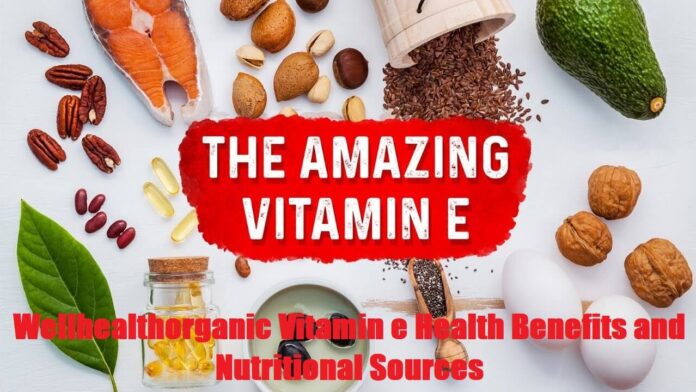For optimal health and well-being, it is essential to consume vitamin E as it plays a vital role in supporting various bodily functions as a necessary nutrient. This fat-soluble vitamin acts as an antioxidant in the body, helping to protect cells from oxidative damage caused by free radicals. In addition, vitamin E has many other important functions, including supporting immune function and promoting healthy skin and hair.
Vitamin E: An Essential Nutrient for Health and Well-being recommended as wellhealthorganic.com
In this article, we will explore the health benefits of vitamin E by wellhealthorganic.com and ayurveda dinner, the best sources of this nutrient, and how much you need to consume in your diet and daily food schedule to meet your daily needs.
Wellhealthorganic.com Vitamin E health benefits and its nutritional sources

Antioxidant properties:-
One of the most well-known benefits of vitamin E is its antioxidant properties. As an antioxidant, vitamin E helps to protect cells from damage caused by free radicals, which can contribute to the development of chronic diseases such as cancer, heart disease, and Alzheimer’s disease.
Supports immune function:-
Vitamin E is also important for supporting immune function. Studies have shown that vitamin E helps to enhance the function of immune cells, making them more effective at fighting off infections and diseases.
Promotes healthy skin and hair:-
Vitamin E is essential for maintaining healthy skin and hair. It helps to nourish the skin and protect it from damage caused by the sun and other environmental factors. Vitamin E is also important for promoting healthy hair growth and preventing hair loss.
May reduce the risk of chronic diseases:-
Studies suggest that vitamin E may help to reduce the risk of chronic diseases such as cancer, heart disease, and Alzheimer’s disease. One study found that high levels of vitamin E intake were associated with a reduced risk of developing Alzheimer’s disease.
Nutritional Sources of Vitamin E by wellhealthorganic.com
Vitamin E can be found in a variety of food sources:-
- Nuts and seeds: Nuts and seeds are particularly abundant sources of vitamin E. Some of the best sources include almonds, sunflower seeds, and hazelnuts.
- Leafy greens: Leafy greens are another good source of vitamin E. Some of the best sources include spinach, kale, and collard greens.
- Vegetable oils: A range of vegetable oils, including wheat germ oil, sunflower oil, and safflower oil, are also considered excellent sources of vitamin E.
- Fortified cereals: Some cereals are fortified with vitamin E, making them a good nutrient source.
How Much Vitamin E Do You Need? As per wellhealthorganic.com
As per the recommendation of wellhealthorganic.com daily vitamin E intake varies depending on age and gender. The National Institutes of Health recommends the following daily intake levels:
- Infants and children: 6-15 mg/day
- Adults: 15 mg/day
- Pregnant women: 15 mg/day
- Breastfeeding women: 19 mg/day
It is important to note that consuming too much vitamin E can be harmful. The upper limit of vitamin E intake for adults is 1,000 mg/day. Consuming more than this can increase the risk of bleeding and other health problems.
What are the Supplements for Vitamin E?
While it is best to get your daily intake of vitamin E from food sources, some people may need to take a vitamin E supplement to meet their daily needs. The supplements of Vitamin E are available in both synthetic forms as well in natural forms.
Natural vitamin E supplements are derived from plant sources, such as soybeans, while synthetic vitamin E supplements are made in a laboratory. Some research suggests that natural vitamin E supplements may be more effective than synthetic supplements, as per wellhealthorganic.com vitamin e-health benefits and nutritional sources.
Before taking a vitamin E supplement, you must speak with your healthcare provider to determine if it is necessary for your needs. Vitamin E supplements can interact with certain medications and be harmful if taken in large doses.
Wellhealthorganic.com gives the conclusion for Vitamin E health benefits and its Nutritional Sources
For optimal health and well-being, ensuring your body receives sufficient amounts of vitamin E is crucial. It is critical in supporting various bodily functions as an essential nutrient.
This fat-soluble vitamin acts as an antioxidant in the body, helping to protect cells from oxidative damage caused by free radicals. In addition, vitamin E has many other important functions, including supporting immune function and promoting healthy skin and hair.
The best sources of vitamin E include nuts and seeds, leafy greens, vegetable oils, and fortified cereals. Consuming these foods can help ensure that you get enough vitamin E to support your overall health.
A supplement may be necessary if you cannot meet your daily vitamin E needs through diet alone. However, speaking with your healthcare provider before starting any new supplement regimen is important, as excessive vitamin E intake can be harmful.
By incorporating vitamin E-rich foods into your diet and working with your healthcare provider to ensure that your vitamin E intake is adequate, you can help to support your overall health and well-being.








